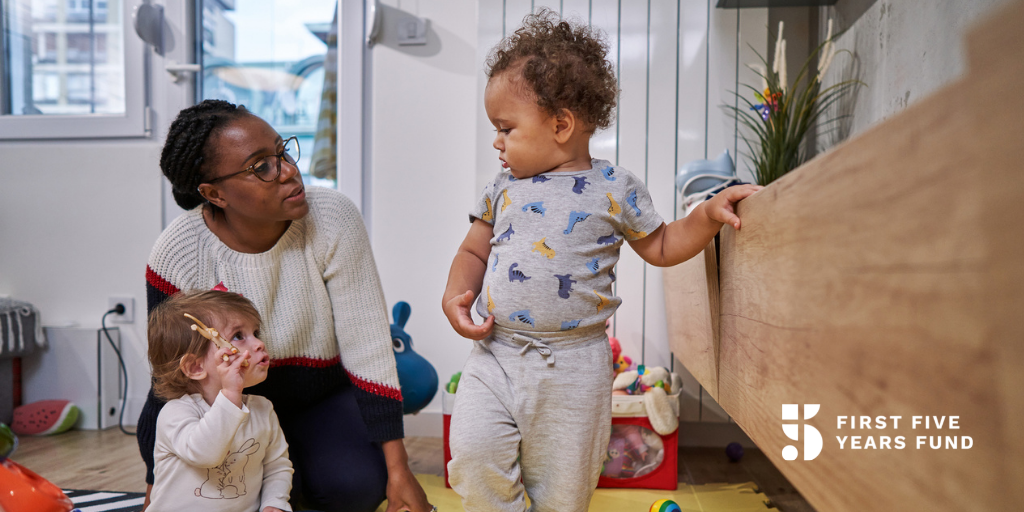A Month Full of Major Developments for Early Learning & Care in Washington

Over the course of the past month, there has been unprecedented attention – and action – on child care and early learning in our nation’s capital. With the introduction of multiple bills and proposals with sweeping reforms and investments in America’s child care system, bipartisan cooperation highlighting on the essential role child care plays for families and our economy during Senate and House committee hearings, and child care and early learning’s starring role in President Biden’s first Joint Address to Congress, there has never been a brighter spotlight on opportunities to address the needs of America’s youngest learners, their families, and the providers who care for them.
Amid the persistent partisan divide in Washington, there is clear agreement among Democrats and Republicans on the need to find child care and early learning solutions for America’s working families.
Take a look at some of the biggest early learning and care moments from just the past month:
Underscoring President Biden’s Understanding that Child Care Is Infrastructure, New Proposal Includes Child Care Facilities Funding
To begin the month, the White House released the details of President Biden’s first major infrastructure proposal, which, alongside investments in highways and bridges, water systems and electrical grids, includes $25 billion to upgrade child care facilities and expands a tax credit for businesses to build child care at places of work. Designed to “reimagine and rebuild a new economy,” the infrastructure proposal underscores the fact that America’s economy cannot recover successfully without a meaningful, sustained investment in building up a system of care for working families.
President Biden Seeks Important Funding Increases for Early Learning & Care Programs in FY2022
The White House released President Joe Biden’s FY2022 budget request to Congress, which includes over $3 billion in proposed funding increases for core federal early learning and care programs like Head Start and Early Head Start; the Child Care and Development Block Grant (CCDBG) program; and the Preschool Development Grant Birth through Five (PDG) program.
American Families Plan Includes Historic Support and Reforms for the Nation’s Early Learning & Child Care System
On April 28th, the White House unveiled the details of President Biden’s American Families Plan, which includes a sweeping reform proposal to significantly and sustainably expand access to and the quality of child care & early learning in America. The president is proposing to provide a $225 billion investment to address the child care needs of families and providers, $220 billion to expand voluntary preschool access to all 3- and 4-year-olds, and a permanent extension of recent improvements from the American Rescue Plan to various tax credits, including to the Child and Dependent Care Tax Credit (CDCTC), among other provisions to help working parents and young children. These investments and tax credits reinforce the benefits of a strong mixed delivery system that prioritizes parent choice, both in whether to utilize non-parental care, but also in determining the type and setting of care that best meets their needs. FFYF’s latest polling shows overwhelming bipartisan support for the provisions included in this proposal.
Child Care for Working Families Act Re-Introduced in Congress
Senator Patty Murray (D-WA) and Congressman Bobby Scott (D-VA) reintroduced the Child Care for Working Families Act (CCWFA), comprehensive legislation that would address longstanding challenges in access, affordability, and quality in early learning and care. The bill would ensure that no low- or middle-income family spends more than 7% of their income on child care, addresses systemic challenges for early childhood educators, including low wages, and would invest in increasing the supply of quality child care in communities, while making other important quality improvements to existing programs. It is estimated that the bill would create at least 2.3 million jobs: 700,000 in the early education profession and 1.6 million parents returning to the labor force as a direct result of greater access to child care, according to U.S. Bureau of Labor Statistics data.
As Congress Crafts Jobs and Infrastructure Package, Ways and Means Chairman Richard Neal Unveils Historic Investment in Child Care and Early Learning
House Ways and Means Committee Chairman Richard Neal (D-MA) unveiled the Building an Economy for Families Act, a bill with a variety of provisions aimed at greatly expanding access to high-quality child care and early learning opportunities for working families who need it by increasing mandatory funding for the Child Care Entitlement to States program to $10 billion per year and making permanent the recent expansion of the Child and Dependent Care Tax Credit (CDCTC) and the Child Tax Credit (CTC) under the American Rescue Plan.
Universal Child Care and Early Learning Act Introduced in Senate, House
Senator Elizabeth Warren (D-MA) and Congressman Mondaire Jones (D-NY) introduced the Universal Child Care and Early Learning Act, which would ensure every family who wants it can access high-quality, affordable child care. By establishing a network of federally-supported, locally administered child care options, families will have access to universally available child care, which gives working parents, especially those living in child care deserts, more options for the care and education of their children.
Vice President Harris Announces $39 Billion in Child Care Relief Going to States
On April 16th, Vice President Kamala Harris announced the Administration would be releasing $39 billion in COVID-19 relief funds for the child care industry that passed as part of the American Rescue Plan, offering critical support help families, including essential workers, access care, while also providing child care providers with critical resources to keep their doors open to serve their communities. During her remarks, Harris spoke about the realities facing child care providers who have been devastated by declining enrollment and increased operational costs created by the pandemic, and how “the strength of our country, the resilience of our economy depends on affordability and the availability of child care.”

In addition to the legislative and executive progress in April to address America’s child care crisis, there was meaningful bipartisan cooperation among lawmakers in committee hearings that made it clear that more must be done to strengthen our child care system.
U.S. Senate HELP Committee Holds Bipartisan Hearing on Strengthening the Child Care Sector
U.S. Senate Committee on Health, Education, Labor, and Pensions (HELP) hosted a bipartisan hearing on “Supporting Children, Workers and Families by Strengthening America’s Child Care Sector.” The hearing highlighted the essential need for child care to shore up our economy and uplift working parents.
Notable quotes from several of the lawmakers and witnesses in attendance can be found below:
- “The pandemic has highlighted how important child care is to build an economy that works for working families.” –Senator Patty Murray (D-WA)
- “Most critical is that we understand parents’ wants and needs for #childcare going forward.” –Senator Richard Burr (R-NC)
Bipartisan House Hearing Examines the Essential Role of Child Care and Paid Leave for Women
The House Ways and Means Committee held a bipartisan hearing titled “In Their Own Words: Paid Leave, Child Care, and an Economy That Failed Women.” In the hearing, members and witnesses engaged in a meaningful conversation about the child care crisis and paid leave, as well as how the COVID-19 pandemic exacerbated existing issues within the child care industry, which in turn impacted working families. The hearing featured both Democratic and Republican members declaring child care is a bipartisan issue and calling to work together toward a solution.
- Chairman Richard Neal (D-MA) opened the hearing by recognizing the child care crisis and its effect on working mothers: “Our failure to recognize basic caregiving obligations in the U.S. has driven millions of women out of the workforce since last March, the majority of those being women of color. Over a year later, many have yet to return, undoing decades of progress towards gender equity in the labor market.”
- Ranking Member Kevin Brady (R-TX) further discussed the crisis and called for bipartisanship, saying: “We do have a closely divided Congress, but we’ve achieved bold, bipartisan solutions in this committee on behalf of working families in the past, and that can be true going forward as well. If we do it right, we can empower moms and dads to pursue their careers while building strong and thriving families. This is common ground for our committee.”
It is clear that child care and early learning are rare bipartisan issues where lawmakers can work together to improve the lives of millions of Americans. In fact, FFYF’s years of polling shows broad support among Republican, Democratic, and Independent voters for a wide range of policy proposals introduced by lawmakers on both sides of the aisle. This indicates there is virtually no political risk for Republican lawmakers to support early learning and care policies, even those facing tough electoral challenges from the left, right, or center.
Subscribe to FFYF First Look
Every morning, FFYF reports on the latest child care & early learning news from across the country. Subscribe and take 5 minutes to know what's happening in early childhood education.



